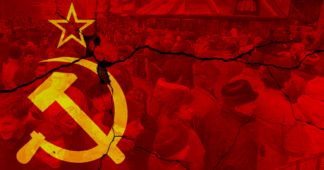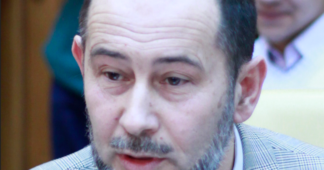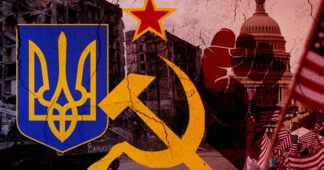By Dimitris Konstantakopoulos
In my previous article on Alexandr Buzgalin and his time, the Perestroika turned Katastroika (https://www.defenddemocracy.
Undoubtedly, the collapse of the USSR raises serious questions about Marxism, even though the existing, real Soviet regime had little to do with any notion of socialism as understood by at least Marx and Lenin. We cannot describe a regime as socialist only on the basis of the criterion of state ownership of the means of production; the actual exercise of power by the workers and the people in general is also required. Socialism means electrification plus the soviets, Lenin had said. Soviet Union achieved electrification, but the Soviets were very quickly reduced to a hollow formula. (On the other hand, the fact that we should not describe the USSR as socialist does not mean that there were no socialist elements in the regime, and certainly not that it was a capitalist regime, as some rather superficial theorists have argued in the past. After all, when it really became capitalist, the earthquake was so great that the whole world immediately took notice).
But if the social consciousness of our time is inevitably burdened by the bankruptcy of the Soviet “really existing socialism”, a look at the world that this bankruptcy has left us, thirty years later, leads to the conclusion that the victorious capitalism of 1991 (the inevitable product of which is the tendency towards “monopoly” and totalitarianism, just as neoliberalism is not a variant of capitalism but its natural evolution) has also gone bankrupt. Not in the sense that its power is threatened in the short run. But because, if one is to judge by the plethora of increasingly clear signs we do have, the perpetuation of this system is multiplying wars and problems, not only making a better world impossible, but threatening the very survival of humanity. A look at Ukraine, at Gaza, at the dramatic explosion of inequalities, within and between countries, at the dramatic situation in which half of humanity lives and dies, at the economic crises, at the rapid degradation of the natural environment necessary for the survival of higher forms of life, is enough to convince any good willing and serious observer that the ever-dominant international capitalist system is not sustainable, — not in the sense, I repeat, that it is necessarily in danger of being overthrown, but rather in the sense that its survival may bring the collapse of all civilisation and is a direct threat for the very survival of humanity. Capitalism looks more and more like a cancer. If left unhindered it will kill the organism (humanity) in which and by the resources of which is living.
We urgently need a new civilisation, a superior form of organisation of our economies and societies, a different international system; to achieve this, Marxism is indispensable, because it is the best analytical tool that human thought has so far produced for understanding, demystifying and transforming our social being. We may need to overcome it, but to do so we must first conquer it and build on it in the same way that Einstein’s Physics dialectically overcame Newton’s Physics.
By the way, if Gorbachev, instead of “praying” in Lenin’s Mausoleum (as a journalist of the Agence France Press saw him doing at dawn, at the time of the fierce conflicts in the Caucasus region) took the trouble to go a few hundred meters further down, to Lenin’s library, and read his book “Imperialism, the highest stage of Capitalism”, he would have immediately understood why the concessions he made to the West in 1989-91 were leading, with mathematical precision, for reasons that were not accidental but systemic, to the wars in Yugoslavia and the Middle East, to the expansion of NATO, to the war in Ukraine and to a risk of nuclear holocaust greater than that ever experienced by mankind during the Cold War. Let me add that various currents who, because they do not want to question capitalism and because they ignore Marxism, think that they will confront the “totalitarian globalist Empire” (the empire of the Financial Capital and US weapons) by returning to the lost paradise of fully independent states or a non-imperialist, non-neoliberal, non-corrupt, ‘good’ capitalism, believe in a chimera, potentially more dangerous than ‘socialism in a single country’. Today it is utterly impossible for any country or region, however large and powerful, to confront alone the great problems menacing the whole of humanity. The refusal of the East and the South to submit to the West is the most important, absolutely necessary and most positive development of our time, but it will also have to lead, at some point, to a new synthesis, if we are to survive.
Marxism and Stalinism
To avoid misunderstandings, I feel the need to explain at this point that, when I refer to Marxism, I certainly mean a current that can have nothing to do with Stalinism, the one being in fact the opposite of the other.
I certainly understand why, seeing where the collapse of the USSR and the restoration of capitalism led, having experienced the social and economic catastrophe of the former Soviet states, or the global consequences of these phenomena, while ignoring the real history of the USSR and the world socialist movement as buried as it was under mountains of deformations, many feel nostalgia for the “strong Soviet state” of “father” Stalin, and aspire to a “strong and social state”. I understand why in Russia itself today a “popular Stalinism” is so widely spread, a nostalgia for past glories, the older the better, so would it seem; for an era which, in its enormous contradictions, certainly had moments of greatness and represents great, undeniable progresses. Besides, our age is one of frightening and very dangerous intellectual decline; the fewer books people read, the more stubbornly they defend all sorts of nonsense; and the more helpless they feel, the more they seek Messiahs and imaginary Paradises, in heaven or in the past.
Russia has often been, throughout the history, a country of extremes, going easily from one to the other as it was facing terrible problems that would easily bring another nation to its knees. If I understand why there is a new cult of Stalin, especially among the youth, as they consider him a symbol of a Russia that has ceased finally to be a “pariah country”, that does not mean that I agree with it. I was not carried away, and on the contrary I found very dangerous the deification of the West when I was witnessing it living in Moscow 30 years ago. And so now I can’t agree and I find the deification of Stalinism (or even Tsarism) very dangerous. I hope that Russia will find now the power to do better than in the past in the synthesis of the elements it needs and the refusal of thos it has to reject fgrom its historical tradition.
There is no doubt that the collapse of the USSR and the introduction of capitalist relations of production and distribution, as well as of the cultural ‘superstructure’ that accompanied them in the former Soviet space, was a catastrophe of historic proportions. But this does not mean that the previous regime can be considered socialist or that it bears no responsibility in its own collapse. Both Marx and Lenin, after all, defined socialism as a regime of a declining state, certainly not the Leviathan of the Soviet bureaucratic, “semi-military” regime.
How and why the strong “Stalino-brezhnevite” state collapsed
It is also worth remembering, when evaluating the Soviet regime, that it did not collapse due to a victorious popular revolution against it or by means of a foreign invasion. It collapsed from within and from above, with the help of foreigners, no doubt, when a significant part of the ruling bureaucracy consciously ceased to defend it, with a view, at least from a certain point onwards, to a capitalist restoration that would turn the bureaucrats and their children into a ruling and owning class. But this could not have happened if it was not inherent as a possibility in the previous system. More than half a century before all this happened, and at a time when it was considered unthinkable, it was described with incredible “prophetic” power, as one of the two possible scenarios for the future development of the USSR, by Stalin’s main opponent, Leon Trotsky, in his book Revolution Betrayed. (We are witnessing now a remarkable variety of very strong opinions about the Bolsheviks in general and Trotsky in particular, especially among people who never read any page of the former or the later). After all, the very initiative for the dissolution of the USSR was undertaken by Boris Yeltsin, a former member of the Politburo of the CPSU, followed by the “communist” leaders of Ukraine and Belarus.
I remember a Soviet diplomat who had worked in the Polish section of the apparatus (apparat) of the Central Committee of the CPSU, the real “centre” of the “Empire”, before realising what was really going on and asking to be transferred to the Ministry of Foreign Affairs. He once told me: “There was no more anti-communist place in the Soviet Union than the apparatus of the Central Committee of the Communist Party.” Alexandr Buzgalin himself, who has been a member of the Central Committee during the last period of the Party’s existence, has said in an interview that he did not know a single Communist in its ranks.
As for the “strong state” argument, that too is superficial, as Alexis de Tocqueville has pointed out with great insight, long before the Russian Revolution. The apparent strength of such a state actually reflects its difficulty in managing creeping contradictions and makes it more, not less, vulnerable in the long run. In the case of the USSR, the proscription of all opposition and, ultimately, of any notion of politics and contradiction, led to the emergence of “counter-revolution” at the very centre of the system, having at the same time deprived society – and even its rulers – of the necessary weapons of criticism and feedback, of the antibodies needed to defend what had to be defended in the regime.
The “strong” Soviet state turned out to be accompanied by a very powerless, weak society, which allowed all its social and other conquests to be easily snatched away. In December and January 1991 one can doubt if there existed more than a hundred or two hundred persons in Moscow who actually resisted the dissolution of the Soviet Union, for which even Gennady Zyuganov’s Communist Party voted. How strong can one consider a state that dissolves so easily into its constituent parts, like a tower of playing cards?
Next Article: USSR 1991: A “democratic Counterrevolution” of the Nomenklatura
Aleksandr Buzgalin and his time. The Soviet/Russian tragedy
We remind our readers that publication of articles on our site does not mean that we agree with what is written. Our policy is to publish anything which we consider of interest, so as to assist our readers in forming their opinions. Sometimes we even publish articles with which we totally disagree, since we believe it is important for our readers to be informed on as wide a spectrum of views as possible.










